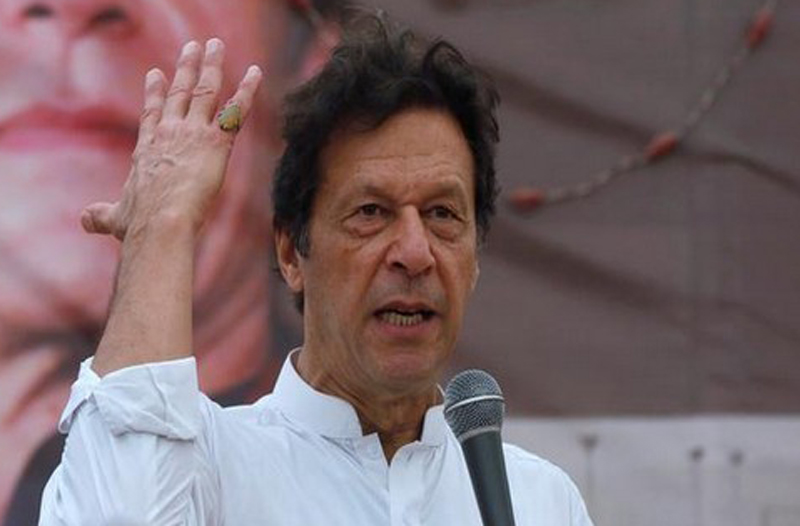In response to India calling off peace talks with Pakistan, Pakistan’s prime minister Imran Khan on Sunday said that his offer of “friendship” to India should not be considered as weakness and the Indian leadership should shun “arrogance” to hold peace talks. Khan, on Thursday, wrote a letter to Prime Minister Narendra Modi, seeking to re-start bilateral talks on key issues including terrorism and Kashmir.
India initially agreed to a meeting between External Affairs Minister Sushma Swaraj and her Pakistani counterpart Shah Mahmood Qureshi on the sidelines of the UN General Assembly in New York in September, however, New Delhi on Friday called off the meeting, citing the “brutal” killing of three policemen in Jammu and Kashmir as well as the release of the postal stamps “glorifying” Kashmiri militant Burhan Wani.
Addressing the Punjab bureaucracy in Lahore on Sunday, Khan said, “I hope the Indian leadership will shun arrogance and hold (peace) talks with Pakistan. Our offer of friendship should not be considered as our weakness. The friendship between Pakistan and India will help overcome poverty”.
Khan also said Pakistan “should not be threatened as it will not tolerate any act of hostility.” The Pakistani prime minister further said, “Friendship (between Pakistan and India) is in the benefit of both the countries. We will not take the pressure of any world power.”
Pakistan foreign minister Shah Mehmood Qureshi on Friday echoed Khan’s reaction and alleged that “internal pressure” forced New Delhi to make the “unfortunate” move.
Army chief General Bipin Rawat said on Saturday that stern action is needed to avenge the barbarism by terrorists and the Pakistan Army against Indian soldiers without resorting to brutality. “We need to take stern action to avenge the kind of barbarism that terrorists and the Pakistan Army have been carrying out against our soldiers.
It is time to give it back to them in the same coin, but not by resorting to similar kind of barbarism. I think the other side must feel the same pain,” the army chief said at a press conference in Jaipur.
The frequency of the back-and-forth between the two neighbours has increased since Khan took over the prime minister’s office on 18 August. On 20 August, Modi wrote to Khan congratulating him for his party’s win at the Pakistan general elections. In his letter, Modi said that New Delhi was looking for constructive and meaningful engagement with Islamabad, and also stressed on a terror-free South Asia in his letter.
In response, Khan had tweeted that the neighbours need to “resolve their conflicts, including Kashmir.” He said, “The best way to alleviate poverty and uplift the people of the subcontinent is to resolve our differences through dialogue and start trading.”
On Thursday, Khan had, in his letter to Modi, asked for the two neighbouring countries to resume dialogue and iron out differences. He had also suggested a meeting between Swaraj and Qureshi. Khan had also said that all major issues, including terrorism and Kashmir, should be resolved through dialogue.
India responded positively to the Pakistan prime minister’s suggestion, however, the violence against policemen Jammu and Kashmir caused New Delhi to withdraw from the arrangement, as the fresh incidents of terrorism went against its policy that concrete steps against terrorism would pave the way for dialogue between the two countries.
As the first official engagement between the two neighbours after Khan took office, officials from both sides met over 29 to 31 August to discuss the use of River Indus waters. A team of officials travelled to Islamabad for a meeting of the Permanent Indus Commission. Pakistan was expected to reiterate its objections over two water storage and hydropower projects being built by India, said media reports.
However, India rejected Pakistan’s objections on its two hydropower projects on the Chenab river at the end of the meeting, as the crucial high-level bilateral talks on the Indus Waters Treaty concluded in Lahore on 30 August. Pakistan’s Commissioner for Indus Waters Syed Meher Ali Shah had said that there would be no briefing and statement on the issue.
The Pakistani government was also expected to raise its concerns over the 1000MW Pakal Dul and 48MW Lower Kalnai hydroelectric projects on two different tributaries of River Chenab despite Islamabad’s serious objections over their designs.

